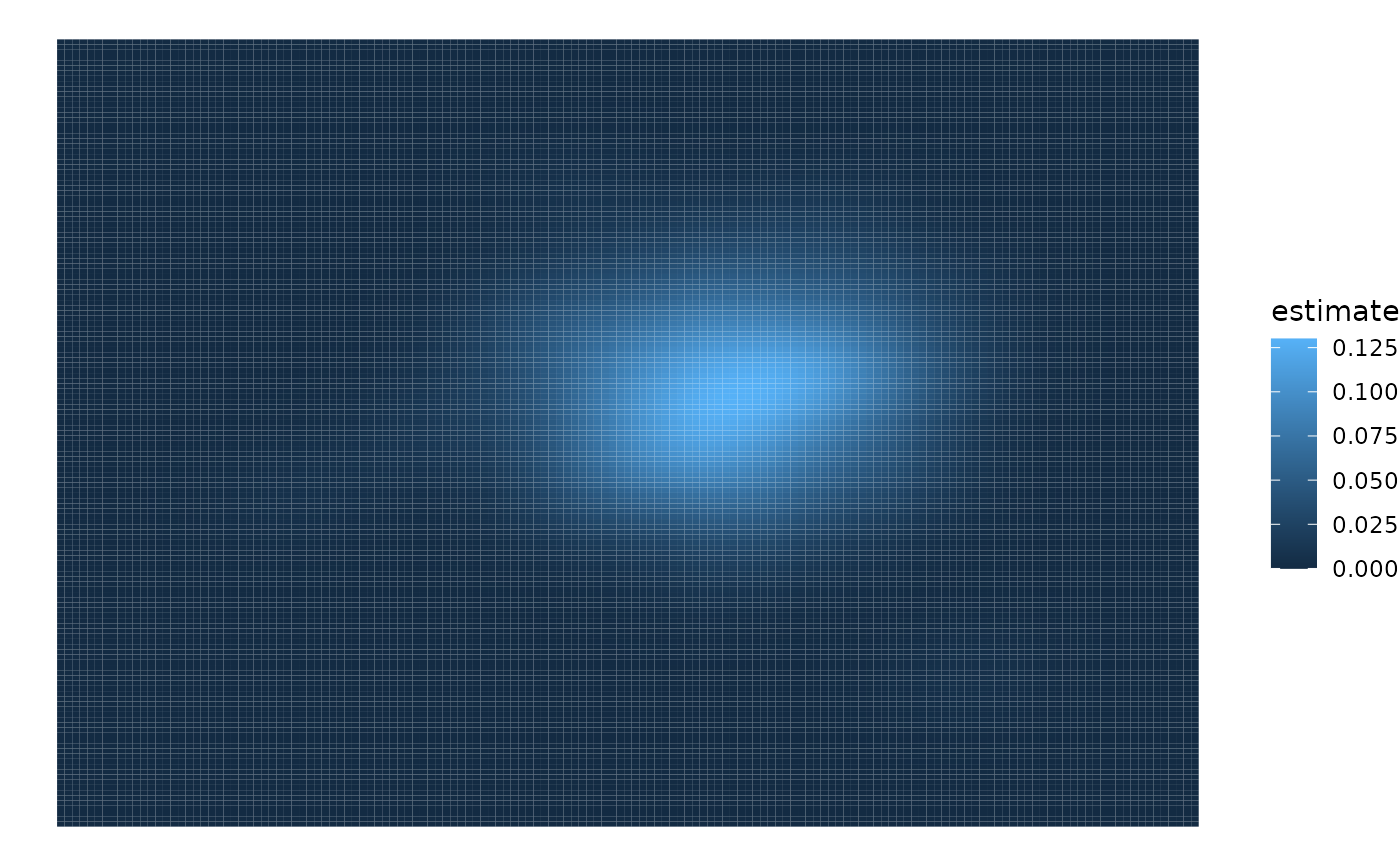Tidy summarizes information about the components of a model. A model component might be a single term in a regression, a single hypothesis, a cluster, or a class. Exactly what tidy considers to be a model component varies across models but is usually self-evident. If a model has several distinct types of components, you will need to specify which components to return.
Usage
# S3 method for class 'kde'
tidy(x, ...)Arguments
- x
A
kdeobject returned fromks::kde().- ...
Additional arguments. Not used. Needed to match generic signature only. Cautionary note: Misspelled arguments will be absorbed in
..., where they will be ignored. If the misspelled argument has a default value, the default value will be used. For example, if you passconf.lvel = 0.9, all computation will proceed usingconf.level = 0.95. Two exceptions here are:
Details
Returns a data frame in long format with four columns. Use
tidyr::pivot_wider(..., names_from = variable, values_from = value)
on the output to return to a wide format.
Value
A tibble::tibble() with columns:
- estimate
The estimated value of the regression term.
- obs
weighted observed number of events in each group.
- value
The value/estimate of the component. Results from data reshaping.
- variable
Variable under consideration.
Examples
# load libraries for models and data
library(ks)
# generate data
dat <- replicate(2, rnorm(100))
k <- kde(dat)
# summarize model fit with tidiers + visualization
td <- tidy(k)
td
#> # A tibble: 45,602 × 4
#> obs variable value estimate
#> <int> <chr> <dbl> <dbl>
#> 1 1 x1 -4.75 0
#> 2 2 x1 -4.68 0
#> 3 3 x1 -4.62 0
#> 4 4 x1 -4.55 0
#> 5 5 x1 -4.49 0
#> 6 6 x1 -4.42 0
#> 7 7 x1 -4.36 0
#> 8 8 x1 -4.29 0
#> 9 9 x1 -4.23 0
#> 10 10 x1 -4.17 0
#> # ℹ 45,592 more rows
library(ggplot2)
library(dplyr)
library(tidyr)
td |>
pivot_wider(c(obs, estimate),
names_from = variable,
values_from = value
) |>
ggplot(aes(x1, x2, fill = estimate)) +
geom_tile() +
theme_void()
#> Warning: Specifying the `id_cols` argument by position was deprecated in tidyr
#> 1.3.0.
#> ℹ Please explicitly name `id_cols`, like `id_cols = c(obs, estimate)`.
 # also works with 3 dimensions
dat3 <- replicate(3, rnorm(100))
k3 <- kde(dat3)
td3 <- tidy(k3)
td3
#> # A tibble: 397,953 × 4
#> obs variable value estimate
#> <int> <chr> <dbl> <dbl>
#> 1 1 x1 -3.92 0
#> 2 2 x1 -3.76 0
#> 3 3 x1 -3.60 0
#> 4 4 x1 -3.45 0
#> 5 5 x1 -3.29 0
#> 6 6 x1 -3.13 0
#> 7 7 x1 -2.98 0
#> 8 8 x1 -2.82 0
#> 9 9 x1 -2.66 0
#> 10 10 x1 -2.51 0
#> # ℹ 397,943 more rows
# also works with 3 dimensions
dat3 <- replicate(3, rnorm(100))
k3 <- kde(dat3)
td3 <- tidy(k3)
td3
#> # A tibble: 397,953 × 4
#> obs variable value estimate
#> <int> <chr> <dbl> <dbl>
#> 1 1 x1 -3.92 0
#> 2 2 x1 -3.76 0
#> 3 3 x1 -3.60 0
#> 4 4 x1 -3.45 0
#> 5 5 x1 -3.29 0
#> 6 6 x1 -3.13 0
#> 7 7 x1 -2.98 0
#> 8 8 x1 -2.82 0
#> 9 9 x1 -2.66 0
#> 10 10 x1 -2.51 0
#> # ℹ 397,943 more rows
